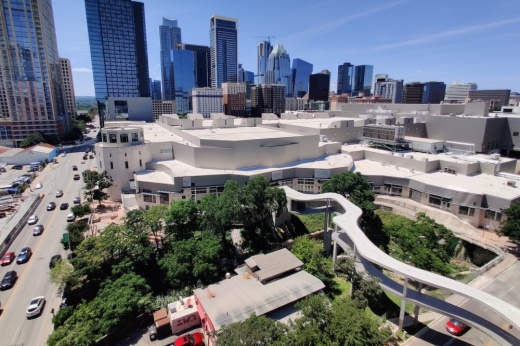Ahead of the multiyear closure and reconstruction of the Austin Convention Center, plans to supplement the civic project with a public-private partnership that could bring more new development and community amenities downtown are also taking shape.
The context
After extensive planning and multiple studies into the need for a new facility, a convention center replacement is now moving forward at an estimated price tag of $1.6 billion.
The new complex is expected to feature more than 700,000 square feet of exhibition space, much of which would be moved underground. Added community and commercial spaces, the reopening of Second and Third streets, and transit connections are all envisioned as well.
The Austin Convention Center will shut its doors next spring before it's demolished. The replacement center is expected reopen before South by Southwest's 2029 festival.
The project is funded with a portion of city hotel occupancy tax, or HOT, collections reserved for the program, as well as the facility's own revenue.
The city is finalizing nearly $1.3 billion in design and construction contracts authorized by City Council last fall, making up the bulk of the project's costs, as well as contracts worth up to $30 million for project management and $1.2 million for marketing.
Zooming in
The new center will be spread across the same downtown footprint, but relocating convention space below-ground is expected to open up some of the property's six square blocks for additional development.
City officials have promoted the idea of a public-private partnership, or P3, for a separate project there that could bring more activity to the site and generate more benefits for Austin.Convention center staff now believe that either a hotel or a market-rate residential development would yield the best returns for the city if such a plan moves forward, based on new analysis presented to City Council on Feb. 13.
“The project can generate significant tax revenue regardless of whether a hotel with ground-floor activities or apartments with ground-floor activities is pursued—though ... the hotel is anticipated to be more lucrative," said Jenifer Boss, a specialist in P3 development with city consultant and engineering firm Hayat Brown. "Additionally, a hotel would be more complimentary to the convention center’s operations."
Those two choices were rated higher than a potential housing project that'd feature some income-restricted units for the local workforce.
Other options, such as an office tower or a fully affordable housing project, were also considered. However, staff said those wouldn't be viable given market and financing factors.

A convention center spokesperson said the new market analysis data is in draft form and couldn't be shared as it's proprietary to the city's consultant.
What they're saying
Whatever new development rises next to the convention center, council members said it should incorporate community priorities and public access to new spaces downtown.
“Austin residents deserve a public space to showcase everything that Austin has to offer, and all their unique talents and all that," council member Zo Qadri said. "I believe we have the counseling to have vision and ambition for something for our future generations, and I’m just really excited at what this development can become.”
Council member Natasha Harper-Madison said she hopes that residents who live farther from downtown would be able to frequent the revamped convention center with options to do business in a new plaza or commercial space.
"I really appreciate that everybody gets to contribute to what makes Austin special, and I think that’s the opportunity that I see here," she said. "While I can appreciate that we are attempting to accommodate and make comfortable our visitors, I hope very much that our convention center is also a destination space for locals; visitors and locals alike to experience what they may not otherwise experience.”
Mayor Kirk Watson wondered whether Austin officials' moving to bring another hotel downtown could spark competition concerns among members of the area's hospitality scene—as well as with the city itself, given its stake in the Hilton Austin next door.
However, convention center staff said local hotel owners hadn't raised issue with the concept of adding another hotel on the convention center property in early conversations about the plan.
One more thing
While the $1.6 billion redevelopment is still anticipated to be fully funded through its own taxes and revenues, staff said a P3 could also help cover those costs. However, council member Ryan Alter asked to ensure that any benefits of the separate P3 project go toward community-oriented improvements first.
“As we look at the [income] waterfall, as it were, to me it seems more appropriate that that public purpose is at the top, and the convention center, if they are to benefit, would come after the public receives that benefit," he said.
What's next
The city's request for a hotel or residential project partnership could be released in March, and a developer could be selected in July.
Staff stressed the need for the possible collaboration to line up closely with the main convention center redevelopment along a similar timeline.
"What we don't want to have is any sort of misalignment that would negatively impact the convention center's delivery, because there is too much riding on that project for that to happen," Boss said.





